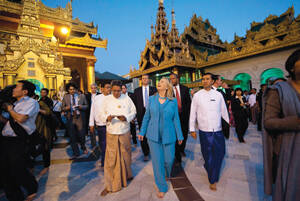While war drums continued to beat toward a possible confrontation with Iran, progress was unexpectedly made in January and February in reducing tensions with another charter member of the “axis of evil” and one “outpost of tyranny.” On Feb. 29, after a third round of direct talks with the United States, North Korea pivoted abruptly and agreed to suspend nuclear weapon and long-range missile tests, to terminate uranium enrichment efforts at its Yongbyon nuclear facility and to allow international nuclear inspectors back in after a three-year absence.
In return, the United States is offering a modest allotment of food aid and “reaffirms that it does not have hostile intent toward” North Korea. According to David Cortright, director of policy studies at the Kroc Institute for International Peace Studies at the University of Notre Dame, from the North Korean perspective the aid was far less significant than the establishment of direct contact with the Obama administration. “They’re not getting a lot” out of the new deal, he said. “What they are getting is a one-on-one relationship with the United States.
“What do [the North Koreans] want? They want to survive,” said Cortright, “and they want to be recognized as a normal state and have normal relations with the United States.” Initiating direct talks was a crucial, if risky, decision by the administration, one which appears to have paid off so far. But, Cortright said, after so many false starts and broken commitments, success for the administration’s initiative cannot be declared until inspectors from the International Atomic Energy Agency are back on the ground. And the deal is still vulnerable, he added, to the domestic shenanigans of a U.S. election cycle. “As with Iran,” he said, “no one in Congress loses politically by being tough on the bad guys.” Between now and November, he said, “there is plenty of time for Congress to work some mischief” that may torpedo ongoing talks.
According to Cortright, the reversal in Pyongyang was somewhat unexpected. The intentions of the nation’s new leader, Kim Jong-un, were and remain unclear. But his leadership could prove more geopolitically productive than the frustrating and mercurial regime of his father, Kim Jong-il, who died in December.
Likewise, progress with Burma’s military-based oligarchs was unexpected, said Cortright. The much-denounced junta appeared stronger than ever, enjoying an improving economy and normalizing relations with its Southeast Asian neighbors.
But the new Burmese leadership, perhaps with an eye to the Arab Spring, abruptly favored greater openness toward democratic expression—releasing political prisoners, renewing efforts to find peace with ethnic rebel forces and allowing the Nobel Peace Prize winner Daw Aung San Suu Kyi to participate in elections planned for April. The Burmese moves have been matched by gestures from the U.S. State Department that could culminate in the complete restoration and normalization of relations.
Many challenges remain. For example, ethnic conflict in Kachin State has actually grown worse since Burma’s President Thein Sein initiated greater acceptance of democratic processes. Still, relations seem finally to be headed in the right direction, according to Cortright. And even though Thein Sein’s new policies “are not by a long shot going to bring a completely free and independent parliament,” said Cortright, “they are the beginning of a process.” He added that Secretary of State Hillary Clinton, as with the North Koreans, has taken judicious risks for progress in Burma in reaching out to Thein Sein as his actions dictated. The success of such diplomatic talking cures, Cortright adds, may be a good model for the United States as it seeks to avoid








